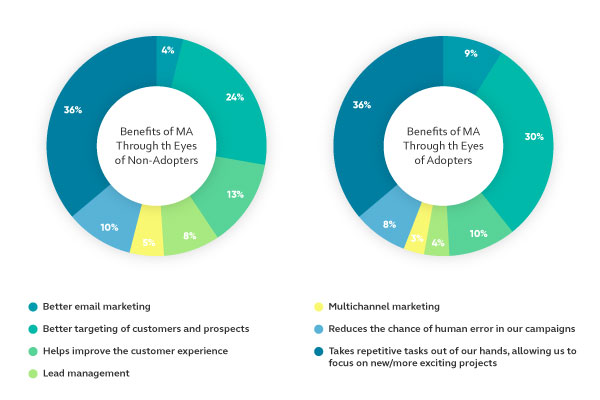Benefits of Marketing Automation
In today’s digital age, marketing automation has become an essential tool for businesses looking to streamline their marketing efforts and drive growth. By automating repetitive tasks and leveraging data-driven insights, companies can enhance their marketing strategies and achieve better results. In this article, we will explore the numerous benefits of marketing automation and how it can help businesses succeed in the highly competitive online landscape.
Increased Efficiency and Productivity
One of the primary advantages of marketing automation is the ability to increase efficiency and productivity. By automating repetitive tasks such as email marketing, social media posting, and lead nurturing, businesses can save valuable time and resources. With automated workflows and personalized messaging, companies can engage with their target audience at scale, without compromising the quality of their interactions. This allows marketing teams to focus on more strategic activities, such as campaign planning and analysis, leading to improved overall productivity.
Enhanced Lead Management and Nurturing
Marketing automation empowers businesses to effectively manage and nurture leads throughout the buyer’s journey. By utilizing lead scoring and segmentation, companies can identify the most qualified leads and deliver targeted content that resonates with their specific needs and interests. Automated lead nurturing campaigns can be triggered based on user behavior, ensuring that prospects receive relevant information at the right time. This personalized approach not only increases the chances of converting leads into customers but also helps build long-term relationships with existing customers.
Improved Customer Engagement and Personalization
With marketing automation, businesses can enhance their customer engagement and deliver personalized experiences at scale. By leveraging customer data and behavior tracking, companies can segment their audience and tailor their messaging accordingly. Automated emails can be personalized with dynamic content, such as the recipient’s name or recent purchase history, making each communication feel more relevant and meaningful. By providing a personalized experience, businesses can foster stronger connections with their customers and drive brand loyalty.
Streamlined Marketing and Sales Alignment
Marketing automation facilitates better alignment between marketing and sales teams, fostering a more cohesive and efficient approach to revenue generation. By integrating marketing automation with customer relationship management (CRM) systems, businesses can ensure a seamless transfer of leads from marketing to sales. This alignment enables sales teams to receive qualified leads with valuable insights, allowing them to prioritize their efforts and close deals more effectively. Through shared data and analytics, marketing and sales te,ams can collaborate and optimize their strategies, leading to improved overall revenue performance.
Data-Driven Decision Making
Marketing automation provides businesses with valuable insights and analytics that can inform data-driven decision make decision-making and analyzing various metrics, such as email open rates, click-through rates, and conversion rates, companies can gain a deeper understanding of their audience’s preferences and behaviors. This data can then be used to optimize marketing campaigns, refine targeting strategies, and identify areas for improvement. With access to real-time data, businesses can make informed decisions that drive better results and maximize their return on investment.

Marketing automation offers a wide range of benefits for businesses operating in today’s digital landscape. From increased efficiency and productivity to enhanced lead management and personalized customer experiences, the advantages are significant. By leveraging marketing automation tools and strategies, companies can optimize their marketing efforts, drive growth, and stay ahead of the competition. Embracing marketing automation is no longer an option but a necessity for businesses looking to thrive in the digital age.
Frequently Asked Questions
1. What is marketing automation?
Marketing automation refers to the use of software and technology to automate repetitive marketing tasks, streamline processes, and improve efficiency.
2. What are the benefits of marketing automation?
Marketing automation offers several benefits, including:
Improved lead generation and nurturing
Increased customer engagement
Enhanced personalization and targeting
Time and cost savings
Improved campaign tracking and analytics
3. How can marketing automation improve lead generation?
Marketing automation allows businesses to capture, track, and nurture leads more effectively. It enables automated lead scoring, personalized lead nurturing campaigns, and timely follow-ups, resulting in higher lead conversion rates.
4. Can marketing automation help in increasing customer engagement?
Absolutely! Marketing automation enables businesses to deliver targeted and personalized content to their customers based on their behavior, preferences, and demographics. This leads to higher customer engagement and satisfaction.
5. How does marketing automation enhance personalization and targeting?
With marketing automation, businesses can segment their audience based on various criteria and deliver tailored messages to specific groups. This level of personalization and targeting helps in building stronger relationships with customers and improving conversion rates.
6. How can marketing automation save time and costs?
By automating repetitive marketing tasks, businesses can save significant time that would otherwise be spent on manual processes. This automation also reduces the need for additional staff, resulting in cost savings.
7. How does marketing automation improve campaign tracking and analytics?
Marketing automation platforms provide detailed analytics and reporting capabilities, allowing businesses to track the performance of their campaigns in real-time. This helps in identifying what works and what doesn’t, making it easier to operate marketing strategies for better results.
8. Is marketing automation suitable for small businesses?
Absolutely! Marketing automation can benefit businesses of all sizes. It helps small businesses streamline their marketing efforts, reach a wider audience, and compete with larger competitors more effectively.
9. Does marketing automation require technical expertise?
While some technical knowledge can be helpful, most marketing automation platforms are designed to be user-friendly and intuitive. Basic training and support are usually provided by the platform providers to help businesses get started.
10. How can I get started with marketing automation?
To get started with marketing automation, you can research and choose a suitable marketing automation platform that aligns with your business needs. It’s recommended to start with a clear strategy and gradually implement automation features to maximize the benefits.




